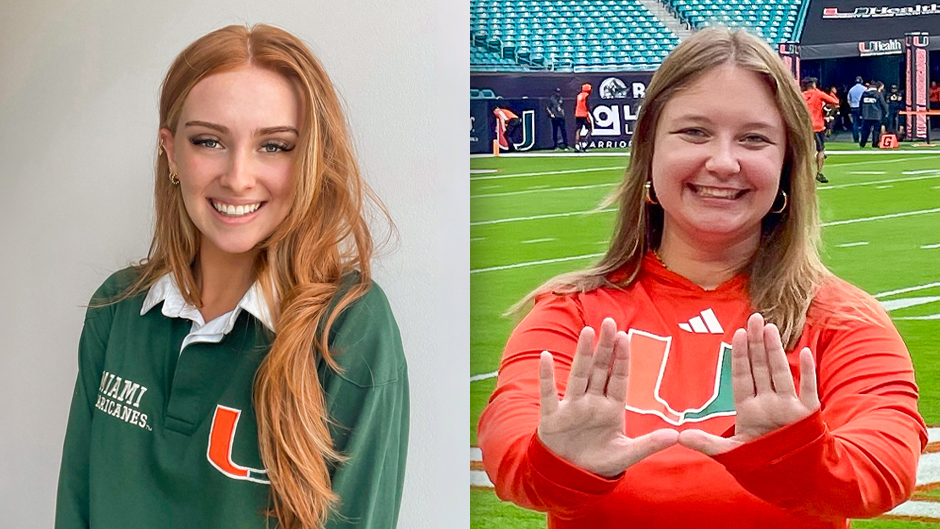Erin Burnett, a junior, has always loved sports. In high school in Mount Olive, New Jersey, she played field hockey, golf, and soccer. Her dream is to become an athletics director with a collegiate or professional sports team.
Toward that end, she is majoring is sport administration at the University of Miami School of Education and Human Development. She is also the student football equipment manager in the Department of Athletics.
Last semester, she heard Teddy Lhoutellier, the University’s sustainability director, talk about the efforts of Green U, the office of sustainability, and she was drawn in by the importance of these efforts for the good of the planet.
Burnett is now the UM Green Athletics Liaison, and her mission is to bring the message of sustainability to athletes and fans.
“It is really about being mindful to the environment,” she said. Her goals are to make sure athletes and fans are aware that even small efforts can make a big difference.
Lhoutellier’s message resonated with her because he emphasized how efforts to create a green environment at the University have always been student driven.
“We have a history that everything regarding sustainability at the U has been thanks to the students,” he said. “It is not very common to see student initiatives turn into powerful organizations.”
From 2007, when a student-led initiative resulted in the University’s commitment to be carbon neutral by 2050 to the establishment of a myriad of programs and groups to sustain the environment, students have always led the effort, said Lhoutellier. He cites the ECO Agency, a group within Student Government that boosts sustainability projects on campus, as one example.
As one of several liaisons throughout the University, Burnett in her role shares information about environmental sustainability initiatives and opportunities while identifying improvements in the units. Her role is particularly important when it concerns large athletic events, which tend to generate a great deal of waste, she said.
One of those events took place on March 6, at the Watsco Center during Miami Hurricanes’ "green” game against Boston College. Videos on sustainability were shown during half-time and participants who signed a plastic free pledge took part in giveaways.
Burnett is currently carrying out audits of the baseball stadium, Alex Rodriguez Park at Mark Light Field, and football cafeteria to determine the kinds of products being used and whether the waste could be minimized and disposed properly.
“Some examples of what I look to find are if they are using more paper or plastic, if there are enough recycling bins, and if they have the correct bags,” she said. “I like to ask about any recent changes they’ve made or about to make.”
For Elizabeth Deese, her love of nature, and particularly the ocean, led her to the Office of Sustainability. As a native Bostonian, she would often sail the New England coast with her family. Deese is a graduate student in the M.A. in Environment, Culture, and Media Program through the Abess Center for Ecosystem Science and Policy.
“Growing up sailing instilled in me a sense of adventure and a reverence and deep connection to the ocean and the environment,” she said. “It taught me to appreciate not only the recreational and aesthetic value of nature, but also its intrinsic value.”
Today, Deese works part-time as the communications coordinator for the Office of Sustainability and has married her love of storytelling with her interest in advocating for green practices.
In addition to maintaining the office’s social media platforms, she creates videos highlighting “green” programs, people, and initiatives around campus.
One such video was on “Sustainable Dining at UM.” It focused on how the dining halls are emphasizing plant-based offerings as well as buying produce from local suppliers and providing students with Ozzi reusable to-go containers.
Deese finds that the messages are well received by the students and staff members.
“In 2024, because of climate change and the array of environmental problems that we are facing, shifting to more sustainable practices helps to mitigate the negative effects,” she said.
“Reducing our individual carbon footprints is profoundly important, but we also have power beyond that. We can vote, educate ourselves, and get involved with local environmental organizations. Not only living as ‘green’ as we possibly can, but also using our power and our voice, will help bring us closer to that more sustainable and equitable future,” Deese added.

